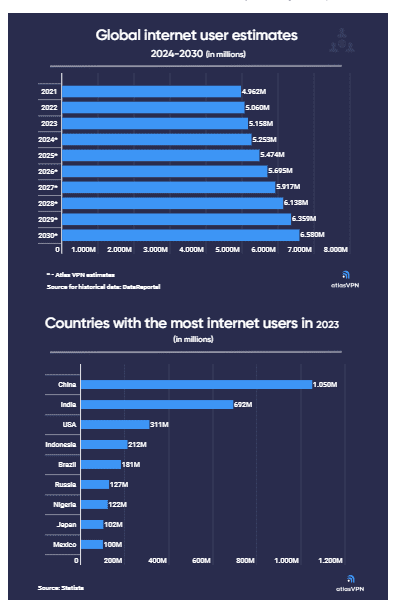The internet has become an essential aspect of our daily lives, altering how we communicate and acquire information, and its influence is set to expand even further.
Recent estimates by the Atlas VPN team indicate that there are currently around 5.16 billion internet users across the globe, representing 64.4% of the world’s population in 2023. By 2028, this figure is projected to increase by approximately 19%, reaching 6.13 billion users.
These estimations are based on historical data from DataReportal, which highlights the significant variations in internet usage and penetration rates across different countries. Developed nations typically have internet penetration rates of over 80%, while less advanced countries may have rates below 50%. Remarkably, the top 20 countries alone account for a staggering 3.67 billion internet users, constituting 71% of the world’s total.

China leads in terms of the largest internet user population, boasting 1.05 billion users, which is over 20% of the global total, with 73.7% of its population having internet access.
India ranks second, with 692 million internet users as of January 2023. However, only about 48.7% of India’s population has internet access, making it below the world’s average. India also has the highest number of unconnected individuals, exceeding 730 million people without internet access.
The United States follows closely with 311.3 million internet users, representing approximately 91.8% of its population with internet access. Indonesia and Brazil are next on the list with 212.9 million and 181.8 million internet users, respectively, and internet access rates of 77% and 84.3%.
Other countries in the top ten include Russia (127.6 million), Nigeria (122.5 million), Japan (102.5 million), Mexico (100.6 million), and the Philippines (85.16 million).
The digital future
As the number of internet users continues to grow and technology advances rapidly, the digital landscape is poised for profound transformations, bringing about new opportunities and challenges that will shape the future of our interconnected world.
With this growth, concerns about data privacy and cybersecurity also escalate. Cyber threats, data breaches, and identity theft are becoming increasingly prevalent in our hyper-connected world. A Gallup poll on world affairs reveals that most Americans consider cyberterrorism as the most pressing danger to the United States.
Preserving the security of users’ digital identities and upholding national security requires taking crucial measures such as bolstering data protection regulations, raising awareness about cybersecurity, and investing in robust cybersecurity technologies.
The anticipated surge in internet users signifies an exciting and transformative digital future. However, it also necessitates proactive initiatives to strengthen cybersecurity measures, advocate sustainable digital behaviors, and equip the workforce to adapt effectively. By implementing these steps, we can embrace the opportunities of the digital age while safeguarding against potential threats.
Read more here.
Feature Image Credit: Freepik
Read Next: AI advancements propel NVIDIA to elite trillion-dollar club, says GlobalData








